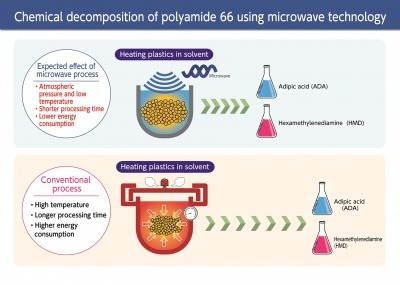Microwave technology used for chemical recycling of plastics
Asahi Kasei and Microwave Chemical have joined forces in a joint demonstration project to develop and commercialise a chemical recycling process for polyamide 66 (PA66) using microwave technology.

PA66 is a type of engineering plastic widely used in various applications, including plastic parts for automotive and electronic products, and yarn for airbag fabric. As demand for this plastic continues to increase worldwide, the need for more sustainable and environmentally friendly manufacturing processes has become paramount.
Laboratory-scale studies that began in fiscal 2021 have confirmed the high-yield depolymerisation of PA66 using microwaves, as well as the principle of the separation and purification process after depolymerisation. Bench-scale equipment will now be assembled at Microwave Chemical’s Osaka Factory by the end of fiscal 2023, and a small-scale demonstration trial using this equipment will be performed in fiscal 2024 to collect basic process data for commercialisation.
The demonstration project aims to enable resource circulation of PA66 for further reduction of GHG emissions. The two companies aim to commercialise a manufacturing process for PA66 that can reduce greenhouse gas (GHG) emissions compared to the conventional manufacturing process.
Based on the results of the small-scale demonstration trial, a decision on the possibility of commercialisation will be made by fiscal 2025 following detailed analysis. Concurrently with the small-scale demonstration trial, construction of a business model that involves the entire value chain in the chemical recycling of PA66 will be advanced – aiming to achieve a circular economy together with stakeholders in the PA66 value chain.
Chemical Recycling: Microwave Chemical and Asahi Kasei
Microwave Chemical is promoting technological and business development to achieve carbon neutrality in the industrial sector. It has been advancing its proprietary PlaWave™ technology platform for decomposing plastic using microwaves. The platform has proven to be highly energy-efficient and capable of depolymerizing PA66 with low energy while obtaining HMD and ADA monomers in high yield. By utilising this technology, the manufacturing process for PA66 using HMD and ADA obtained by depolymerisation can reduce GHG emissions compared to the conventional PA66 manufacturing process. Further reduction of GHG emissions may be achieved by the use of renewable energy for the power required to generate the microwaves.
Asahi Kasei, a major producer of PA66, has been manufacturing fossil fuel-derived HMD and ADA as intermediates for over half a century. They are now committed to becoming a global partner for their PA66 customers by providing optimal solutions for their carbon neutrality initiatives through studies of the practical application of material recycling and chemical recycling, as well as trials for the commercialisation of PA66 made using biomass-derived intermediates.









